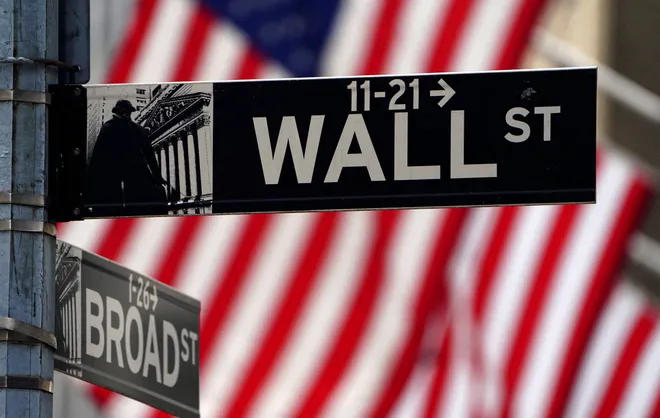Dow closes at record high after attempted Trump assassination fuels red wave hope
A green, not red, wave swept over the U.S. stock market on Monday as investors placed bets that not only would former President Donald Trump win the White House in November, but he’d carry Congress with him, analysts said.
The Dow Jones Industrial Average closed at a record high 40,211.72 while the broad Standard & Poor’s 500 index touched the all-time high of 5,666.94 during the session after Trump survived an assassination attempt at a rally over the weekend. The failed assassination gives Trump strong momentum going into the Republican National Convention (RNC) on Monday in Milwaukee, Wisconsin, and that's spilling over into hopes Republicans can win Congress, analysts said.
A Republican sweep of the White House and both chambers of Congress would potentially give Republicans an easier time of passing “business friendly” legislation, they said. If businesses do well, their stock prices usually rise.
“Before the weekend, markets already thought it was likely (former) President Trump president would win, but the overall 'red wave' scenario wasn’t my base case,” said independent stock market analyst Ed Moya. “There’s strong momentum here now for that.”
What a red wave could mean for businesses (and stocks)?
- Less regulation. “We are seeing a glimpse of how market players want to express a Trump Presidency – and clearly, that outcome is positive for U.S. equity, notably with promises of deregulating industry, which would be a strong positive kicker,” said Chris Weston Head of Research at trading platform Pepperstone.
- Lower taxes. The last major tax legislation by the Trump administration was Trump’s Tax Cuts and Jobs Act of 2017 (TCJA), which included a cut in the top marginal corporate tax rate to 21% from 35% and larger deductions for business investments.
“Absent congressional action, the end of 2025 will witness the expiration of many more TCJA provisions with serious, adverse impacts to both individuals and businesses of all sizes,” the U.S. Chamber of Commerce said.
Critics warn, though, extending TCJA tax cuts would result in a soaring deficit, which is generally seen as bad for the economy and American consumers.
Extending nearly all expired, expiring, and changing tax provisions would add $5.2 trillion ($6.1 trillion with interest) to deficits through FY 2035, up from $4.7 trillion previously, the nonpartisan, non-profit Center for a Responsible Federal Budget said.
“Given the immense cost, policymakers should not enact a deficit-financed extension of all or part of the TCJA,” it said.

How realistic is a red wave?
With polls increasingly favoring Trump, it’s undeniable that the “future is now heavily skewed towards the Republicans taking both the White House and Senate, but they also have a real shot at taking the House, something that was seen as a low probability a few weeks ago,” Weston said.
However, “a lot can still happen between now and November,” Moya said. “Given both candidates’ ages, maybe we’ll see two different people running” for president by November.

Will Trump’s momentum keep stocks rallying?
“Markets are emotionally driven,” said Matt Chancey, a certified financial planner in Florida. “Any time there’s an assassination attempt, it’s always favorable to the person who’s being targeted.”
President Ronald Reagan’s approval rating soared about 10 points after John Hinckley Jr. tried to assassinate him in 1981.
But those bumps aren't reliable long-term indicators for the stock market.
“How people will feel next week, I have no idea,” he said. "There's no way something that happens today will continue a spike (in stocks) for four months (until the election). There are going to be peaks and valleys along the way."
Trump Media stock soars:DJT shares surge after Trump assassination attempt
What else could boost the stock market?
Stocks could continue rallying, but it’s more likely to be about lower inflation, a slower economy, and expectations for interest rate cuts rather than Trump, analysts said.
“If we are right in thinking that those trends will continue and the (Federal Reserve) starts to ease policy in September, that will probably continue to matter more for market participants than the ups and downs of the election campaign,” said Jonas Goltermann, deputy chief markets economist at research firm Capital Economics.
Strong company earnings would also bolster stocks, Moya said. Companies just started reporting second-quarter results, with major banks like Goldman Sachs, Citigroup and JP Morgan reporting strong profits, but he said artificial intelligence (AI) stocks will be key.
“A lot will depend on how the AI trade holds up,” he said. “Once we get past key semiconductor earnings, we’ll have a better outline to see if there’s enough momentum to keep going.”
Semiconductor stocks people are watching include Nvidia and Advanced Micro Devices.
Medora Lee is a money, markets, and personal finance reporter at USA TODAY. You can reach her at mjlee@usatoday.com and subscribe to our free Daily Money newsletter for personal finance tips and business news every Monday through Friday morning.
Disclaimer: The copyright of this article belongs to the original author. Reposting this article is solely for the purpose of information dissemination and does not constitute any investment advice. If there is any infringement, please contact us immediately. We will make corrections or deletions as necessary. Thank you.







